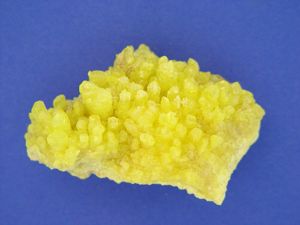Sulfur
 From Conservapedia
From Conservapedia | Sulfur or sulphur | |
|---|---|
| Properties | |
| Atomic symbol | S |
| Atomic number | 16 |
| Classification | Non-metal |
| Atomic mass | 32.1 amu |
| Other Information | |
| Date of discovery | Known from ancient times |
| Name origin | From the Latin word sulphurium (brimstone) |
| Uses | Matches, gunpowder, medicines |
| Obtained from | Naturally |
Sulfur is the 16th element of the periodic table. It is a solid nonmetal that makes up part of the Earth's crust, and is a part of gunpowder and batteries.
The name comes from the Latin word sulphurium, which means brimstone.[1] 'Brimstone' is an ancient word for sulfur (it is often found round the rim of volcanic vents), and occurs in both the Old and New Testaments of the Bible. In Genesis 19, God destroys Sodom and Gomorrah with 'fire and brimstone', and brimstone has traditionally been associated with Hell and the Devil.
Elemental yellow sulfur itself is almost odorless, but many sulfur compounds have strong odors. Hydrogen sulfide has the offensive odor of rotten eggs. The mercaptan family of compounds that give skunks their odor, and which are deliberately added to natural gas because they can be detected in extremely low concentrations, are organic sulfur compounds, as is the compounds that give garlic and onions their smell.
Gallery[edit]
References[edit]
| Periodic Table of the Elements | ||||||||||||||||||||||||
|---|---|---|---|---|---|---|---|---|---|---|---|---|---|---|---|---|---|---|---|---|---|---|---|---|
| 1 | 2 | 3 | 4 | 5 | 6 | 7 | 8 | 9 | 10 | 11 | 12 | 13 | 14 | 15 | 16 | 17 | 18 | |||||||
16
S 32.064 |
||||||||||||||||||||||||
| *Lanthanides | ||||||||||||||||||||||||
| **Actinides | ||||||||||||||||||||||||
↧ Download as ZWI file | Last modified: 02/24/2023 22:38:25 | 59 views
☰ Source: https://www.conservapedia.com/Sulfur | License: CC BY-SA 3.0
 ZWI signed:
ZWI signed:

 KSF
KSF